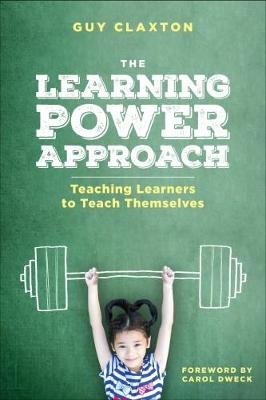
The Learning Power Approach
Corwin Press Inc (Verlag)
978-1-5063-8870-0 (ISBN)
Become mind-fit for life!
Learning is learnable! Educators can explicitly teach not just content, knowledge and skills, but also positive learning attitudes and habits of mind. Guy Claxton’s The Learning Power Approach will help teachers understand how ‘every lesson, every day’ shapes the way students see themselves as learners. This is the beauty of the Learning Power Approach: it is something all teachers can integrate into their daily practice. Claxton’s work helps us notice ‘what lies beneath’ the surface of our teaching and attend more closely to the way we shape dispositions and attitudes. Readers will find:
• approaches focused on building character alongside knowledge acquisition
• cognitive, social and neuroscientific supportive evidence
• practical illustrations and strategies
Written by a renowned cognitive scientist, this book offers a ground-breaking set of design principles for strengthening students’ learning muscles.
"This is the beauty of the Learning Power Approach. It is not a program, not a subject, not an add-on - it is something all teachers can integrate into their practice on a daily basis. Claxton’s work helps us notice ‘what lies beneath’ the surface of our teaching and to attend much more closely to the way we shape dispositions and attitudes to learning."
Kath Murdoch, Education Consultant
University of Melbourne, Melbourne, Australia
Guy Claxton is Professor of the Learning Sciences at the University of Bristol Graduate School of Education, where he directs the research initiative on Culture, Learning, Identity and Organisations (CLIO). His books include The Wayward Mind: An Intimate History of the Unconscious (2005), Learning for Life in the 21st Century: Sociocultural Perspectives on the Future of Education (2002, co-edited with Gordon Wells), Wise Up: Learning to Live the Learning Life (1999) and the best-selling Hare Brain, Tortoise Mind: Why Intelligence Increases When You Think Less (1997). His current work focuses on the development of infused approaches to the cultivation of positive lifelong learning dispositions in schools. The resulting ′Building Learning Power′ approach has influenced practice in schools throughout the UK, Australia and New Zealand.
Foreword
Acknowledgments
About the Author
Chapter 1. The Origins of the Learning Power Approach
Nuclear Family
Godparents
Friends and Neighbors
Near Misses
A Socket Set
Chapter 2. What Is Learning?
Why Do We Learn?
When Do We Learn?
What Is the Launchpad for Learning?
What Do Learners Actually Do?
The Beginnings of Learning Power
So Can You Get Better at Learning?
What Kinds of Learning Are Going On in Classrooms?
Chapter 3. What Exactly Is the Aim of the Learning Power Approach?
Diving In: The Aim of the Learning Power Approach
Some Flesh on the Bones
Chapter 4. How Do I Get Started? Some Quick Wins
The LPA Menu du Jour
Curious, Adventurous, Determined, Collaborative: A Starter Kit of Learning Dispositions
A Reflective Exercise
Chapter 5. Why Does Learning Power Matter? 10 Good Reasons for Pumping Those Learning Muscles
1. Because Life Is Complicated
2. Because Learning Power Makes the World a Safer Place
3. Because We Won’t Always Be There
4. Because Good Learners Are More Successful in Life
5. Because Employers Want to Hire Powerful Learners
6. Because Powerful Learners Do Better in School
7. Because Powerful Learners Do Better in College
8. Because It Makes Teaching Easier and More Rewarding
9. Because People Are Happier When They Are Learning
10. Because Young People’s Mental Health Depends Upon Their Learning Power
Chapter 6. What Is Learning Power Made Of?
The Elements of Learning Power
Chapter 7. Learning Power in Action: Some Classroom Illustrations
Chapter 8. Design Principles of the LPA Classroom
1. Create a Feeling of Safety
2. Distinguish Between Learning Mode and Performance Mode
3. Organize Compelling Things to Learn
4. Make Ample Time for Collaboration and Conversation
5. Create Challenge
6. Make Difficulty Adjustable
7. Show the Innards of Learning
8. Make Use of Protocols, Templates, and Routines
9. Use the Environment
10. Develop Craftsmanship
11. Allow Increasing Amounts of Independence
12. Give Students More Responsibility
13. Focus on Improvement, Not Achievement
14. Lead by Example
Chapter 9. What Is the Evidence for the Learning Power Approach?
Does Curiosity Affect Learning?
What About Concentration?
Can Learners’ Resilience Be Deliberately Increased?
Does Resilience Contribute to Raising Achievement in School?
Does Imagination Improve Learning and Creativity, and Can People Get Better at Imagining?
Do Deliberate Attempts to Teach Students to Think Clearly Work? And Do They Improve School Performance?
What About Collaboration?
Does the Same Apply to Empathy?
Does Reflection Aid Learning?
Does Learning Power Developed in One Context Transfer to Other Contexts?
Chapter 10. Distinctions and Misconceptions
Focus on Learning Power, Not Just Learning
Learning, Not Thinking
Learning Dispositions Are Malleable, Not Fixed
Is the LPA “Traditional” or “Progressive”?
Evidence, Not Measurement
Precision About Language
Learning Muscles and the Mind Gym
Pedagogy Rules
It’s Not Just Classrooms; It’s the Ethos of the Whole School
Provisional and Growing, Not Set in Stone
Chapter 11. Joining the Culture Club
Bibliography and References
Resources and Further Reading
Index
| Erscheinungsdatum | 31.01.2018 |
|---|---|
| Reihe/Serie | Corwin Teaching Essentials |
| Verlagsort | Thousand Oaks |
| Sprache | englisch |
| Maße | 152 x 228 mm |
| Gewicht | 470 g |
| Themenwelt | Geisteswissenschaften ► Psychologie ► Pädagogische Psychologie |
| Sozialwissenschaften ► Pädagogik ► Schulpädagogik / Grundschule | |
| ISBN-10 | 1-5063-8870-1 / 1506388701 |
| ISBN-13 | 978-1-5063-8870-0 / 9781506388700 |
| Zustand | Neuware |
| Informationen gemäß Produktsicherheitsverordnung (GPSR) | |
| Haben Sie eine Frage zum Produkt? |
aus dem Bereich


